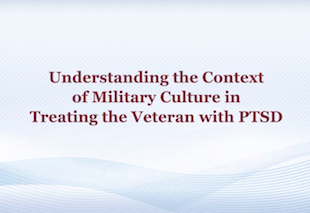PTSD: National Center for PTSD
Understanding the Context of Military Culture and PTSD
Continuing Education
This section brings together free in-depth Continuing Education resources for the Professional community concerned with trauma.
Understanding the Context of Military Culture and PTSD
- Date Created: 01/10/2017
- Time to Complete: 1.5 hours
- Credits: APA, ASWB, Other Orgs
- Skill Level: Basic
- Course Series: PTSD 101
 Author(s):
Author(s):
Description
Studies show that because of the lack of cultural competence among providers, Service members and Veterans may drop out of care, are misdiagnosed, or seek care only when their illness or injury is at an advanced stage. This course, Understanding the Context of Military Culture in Treating Veterans with PTSD, addresses such concerns by providing information about how the influence of military culture may impact world view, assessment, and treatment planning for military patients with PTSD.
This course includes video to illustrate how developing core competencies related to military culture can improve rapport, compliance, and adherence to treatment among Service members and Veterans with PTSD.
Goals and Objectives
- Identify implications of military culture on health care for Service members and Veterans with PTSD.
- Conceptualize and understand a patient's PTSD and other comorbid conditions based on knowledge of possible risk and resilience factors for both the patient in general, and specific factors for military culture.
- Describe the importance of incorporating culturally-informed principles into practice, based on knowledge of the challenges and strengths of being a Service member or Veteran with PTSD.


























